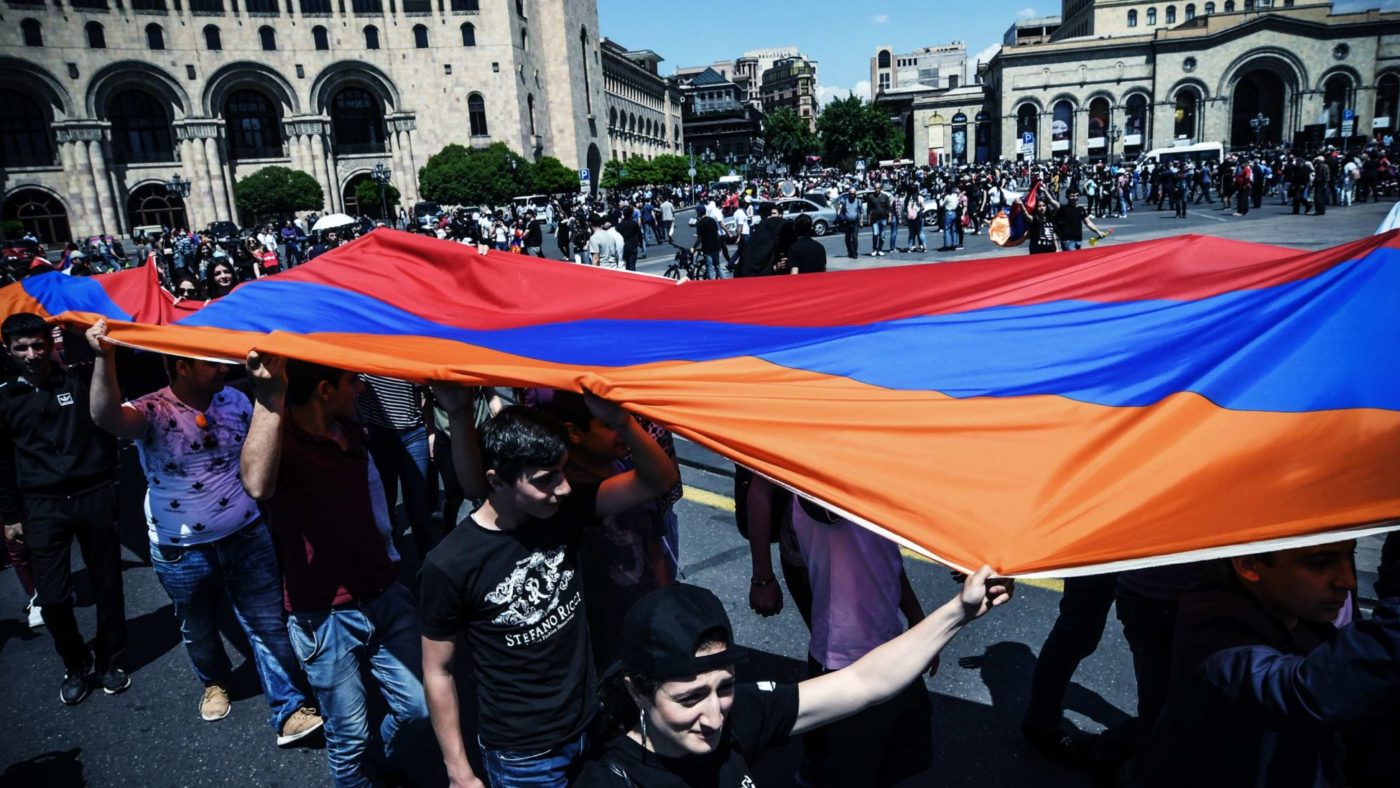In declaring that “the liberal idea” had “become obsolete” in June, Vladimir Putin reawakened a fear prevalent among supporters of liberal democracy: that a rising tide of authoritarianism is rolling back the progress of the post-Cold War era.
These fears are felt particularly keenly in the regions between Europe and Asia. Since 2014, an authoritarian and revanchist Russia has sought to expand its sphere of influence beyond its national borders. In Turkey, President Erdogan has suppressed dissent and steadily accumulated greater, and increasingly unfettered, executive power.
The Republic of Armenia had provided an encouraging counterpoint to this trend. The peaceful ‘Velvet Revolution’ of May 2018 propelled current Prime Minister Nikol Pashinyan into office on a platform of promoting transparency and accountability for corruption. The landslide victory won by the former grassroots protester in the subsequent general election last December provided him with the parliamentary majority to institute meaningful legislative reform.
These developments were widely welcomed by international observers. Freedom House’s latest ‘Freedom in the World’ report ranked Armenia as the country with the third greatest aggregate improvement in political rights and civil liberties in 2018.
As the first anniversary of the revolution passed, however, the fragility of this progress became clear, as the government appeared to renege on its commitment to uphold the rule of law and ensure a politically independent judiciary.
This May, Pashinyan published a video online calling on his supporters to blockade courts throughout the country, prompting thousands of demonstrators to surround courthouses. The Parliamentary Assembly of the Council of Europe for the monitoring of Armenia, Armenia’s human rights ombudsman, and the US Embassy in Yerevan all united in their condemnation of this action.
The trigger for this political intervention against the independent judiciary was a court’s decision to release Robert Kocharyan on bail. He is a former President of Armenia and one of Pashinyan’s political rivals, who had been detained as part of an investigation into his decision in 2008 to declare a state of emergency to deal with mass protests against the election of his successor, Serzh Sargsyan – protests which resulted in multiple fatalities.
A transparent and independent inquiry into the unrest of 2008 is welcomed by all international observers who hoped to witness the dawn of a new liberalism in Armenia. It is entirely consistent with the stated principles of both the Velvet Revolution and the government it installed. Heavy-handed political intimidation and interference in an ongoing judicial process, by contrast, is not – particularly when Pashinyan is by no means a disinterested party, having been actively involved in the protests 11 years ago.
Further flashpoints have followed. In July, the Armenian Special Investigations Service searched and seized the contents of the office of Davit Grigorian, the presiding judge who ordered Kocharyan’s release under personal guarantee, as part of a criminal investigation into alleged forgery.
At present, Kocharyan remains under arrest with his trial delayed until early November due to some medical treatments. But this eventuality has not been without significant legal and political wranglings. In early September, the Constitutional Court ruled that Kocharyan’s arrest was unconstitutional because it does not take account of current and former senior Armenian officials’ legal immunity from prosecution. An appeal to dismiss the charges on these grounds was, however, rejected. The day before this, the Speaker of the Parliament claimed that the Constitutional Court’s ruling was illegal – a sentiment supported by Prime Minister Pashinyan. It beggars belief that this political influence had no bearing on the new judge, Anna Danibekyan’s, decision.
Furthermore, on 4th October, the Armenian Parliament voted to strip the head of the Constitutional Court, Hrayr Tovmasyan, of his judicial powers. Although the claim was ultimately rejected by the Constitutional Court it is telling that the debate was led by Pashinyan’s My Step group who argued that Tovmasyan had a conflict of interest in the trial of ex-President Robert Kocharyan, because of his history and personal ties with the former ruling Republican Party. His supporters counter that this is just retaliation for the ruling in early September and point to recent investigations by the National Security Services into members of Mr Tovmasyan’s family as further evidence of intimidating and underhand practices.
Supporters of the government might argue that an aggressive shake-up of the judiciary falls firmly within the remit of a radical reformist government. However, with such significant accusations of undue influence on both sides, there is a growing tit-for-tat appearance to these judicial skirmishes and are seem to be threatening to boil over to something much more sinister. It is therefore hard to shape a positive picture of a country successfully reforming and winning the country’s and international community’s trust.
Armenia is now at a critical juncture. The country was emerging as a rare beacon of liberal-democratic values at a time when the threat of a return to authoritarianism loomed as large in Eurasia as anywhere else in the world. The international community must hold the Armenian government accountable for upholding the rule of law and abiding by the guiding principles of the revolution which so recently brought it to office.
Click here to subscribe to our daily briefing – the best pieces from CapX and across the web.
CapX depends on the generosity of its readers. If you value what we do, please consider making a donation.


